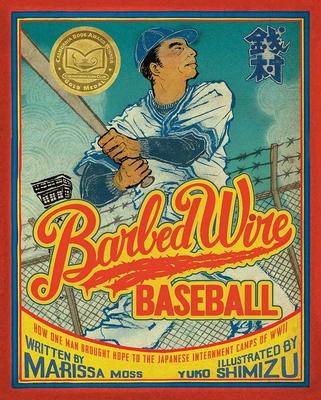
Book
Barbed Wire Baseball: How One Man Brought Hope to the Japanese Internment Camps of WWII
by Marissa Moss
(Write a Review)
Unfortunately this title is no longer available
California Reading Association's Eureka! Nonfiction Children's Book Awards - HONOR
Notable Children's Books from ALSC 2014 As a young boy, Kenichi Zenimura (Zeni) wanted to be a baseball player, even though everyone told him he was too small. He grew up to become a successful athlete, playing with Babe Ruth and Lou Gehrig. But when the Japanese attacked Pearl Harbor in 1941, Zeni and his family were sent to one of several internment camps established in the U.S. for people of Japanese ancestry. Zeni brought the game of baseball to the camp, along with a sense of hope, and became known as the "Father of Japanese American Baseball." "Moss is a skilled author of historical narrative nonfiction for young readers; her tale is both well researched and well told. But it's the visually stunning, sensitive illustrations by the hugely talented Shimizu that make the book a standout." --New York Times Book Review "Shimizu's Japanese brush and ink illustrations, digitally layered with dusty colors suggestive of the arid relocation camp, are a visual feast, from the patterned swirls of battleship steam and desert dust, to the series of depictions of Zenimura in motion, to the rhythmic composition of the female detainees stitching the potato-sack uniforms." --Bulletin of the Center for Children's Books
California Reading Association's Eureka! Nonfiction Children's Book Awards - HONOR
Notable Children's Books from ALSC 2014 As a young boy, Kenichi Zenimura (Zeni) wanted to be a baseball player, even though everyone told him he was too small. He grew up to become a successful athlete, playing with Babe Ruth and Lou Gehrig. But when the Japanese attacked Pearl Harbor in 1941, Zeni and his family were sent to one of several internment camps established in the U.S. for people of Japanese ancestry. Zeni brought the game of baseball to the camp, along with a sense of hope, and became known as the "Father of Japanese American Baseball." "Moss is a skilled author of historical narrative nonfiction for young readers; her tale is both well researched and well told. But it's the visually stunning, sensitive illustrations by the hugely talented Shimizu that make the book a standout." --New York Times Book Review "Shimizu's Japanese brush and ink illustrations, digitally layered with dusty colors suggestive of the arid relocation camp, are a visual feast, from the patterned swirls of battleship steam and desert dust, to the series of depictions of Zenimura in motion, to the rhythmic composition of the female detainees stitching the potato-sack uniforms." --Bulletin of the Center for Children's Books
Paperback
$10.99